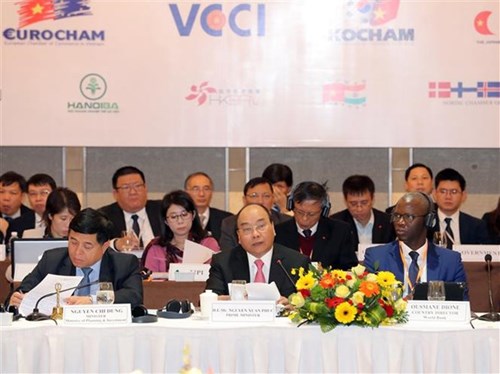In his speech at the annual government – enterprise dialogue, Phuc acknowledged the business community’s contribution to national socio-economic development, noting that recommendations and proposals of the business community at both micro- and macro-level have assisted with the Government’s efforts in developing the country.
    |
 |
| Prime Minister Nguyen Xuan Phuc speaking at the 2017 Vietnam Business Forum (VBF)’s year-end session in Hanoi on December 12 |
The PM highlighted the strong growth of the Vietnamese economy as 2017 is coming to an end, with all 13 targets set for the year achieved or over fulfilled. The GDP growth, at 6.7 percent, is the highest in nearly 10 years.
He expressed his delight at the record number of over 120,000 newly established firms and an estimated VND three million billion in registered capital forecast for this year.
Investment in the economy not only benefits enterprises and investors, but also supports the Government’s reform efforts, Phuc said.
Despite this, the PM noted that Vietnam needs to work harder to improve its ranking of business climate and competitiveness, towards ranking among top countries in ASEAN and meeting high standards set by the Organization for Economic Cooperation and Development (OECD).
Concerning new trends impacting on business models in Vietnam, the PM pointed to the expansion of the middle-income group, citing a World Bank report that showed the group now makes up 10 percent of the Vietnamese population; the proportion is projected to hit 50 percent by 2035. The trend will change the local consumption structure, thus opening up business opportunities.
He also highlighted technology development in the era of the 4.0 industrial revolution, automation and artificial intelligence.
Vietnam has 52 million internet users and about 55 percent of its population own smart phones. By 2020, eight in every 10 Vietnamese will use smart phones. The situation lays an important basis for investors to promote their products and services among potential Vietnamese clients, the PM said.
Phuc emphasized that new drives for growth must be innovation and initiatives.
Mentioning the increasing impact of digitizing the management and supply of services, he said current limits and shortcomings of public services are pushing the Government to build an open-source e-governance system, which he considers a new growth drive.
“Infrastructure and technology development are key to integration and welfare distribution,” said the PM.
The Government will prioritize investment in infrastructure towards smart and efficient connectivity to improve transparency, and help businesses cut cost and boost competitiveness, while encouraging capital flow into education and technology, he added.
Considering stable macroeconomics and society a competitive edge, Phuc said the Government would continue restructuring the economy, overhauling the State-owned business sector, handling bad debts, controlling budget deficit and public debts, reforming the taxation system, and improving social welfare policy.
The Government pins hope on a new generation of businesses that are capable of competing at home and overseas, the leader stressed, adding that Vietnam is working to build a business climate that facilities all economic sectors.
At the same time, PM Phuc affirmed that Vietnam does not welcome business activities that pollute the environment, degrade cultural values, and illegally exploiting local labor.
Based on that spirit, the PM said he believes the VBF will continue being an important and effective policy dialogue between the Government and enterprises toward meeting sustainable socio-economic development goals.
The Vietnam Business Forum (VBF), which opened in Hanoi on December 12, is an annual dialogue between the Government and business community, co-organized by the Ministry of Planning and Investment, World Bank, International Finance Corporation, and VBF Consortium.
Source: VNA